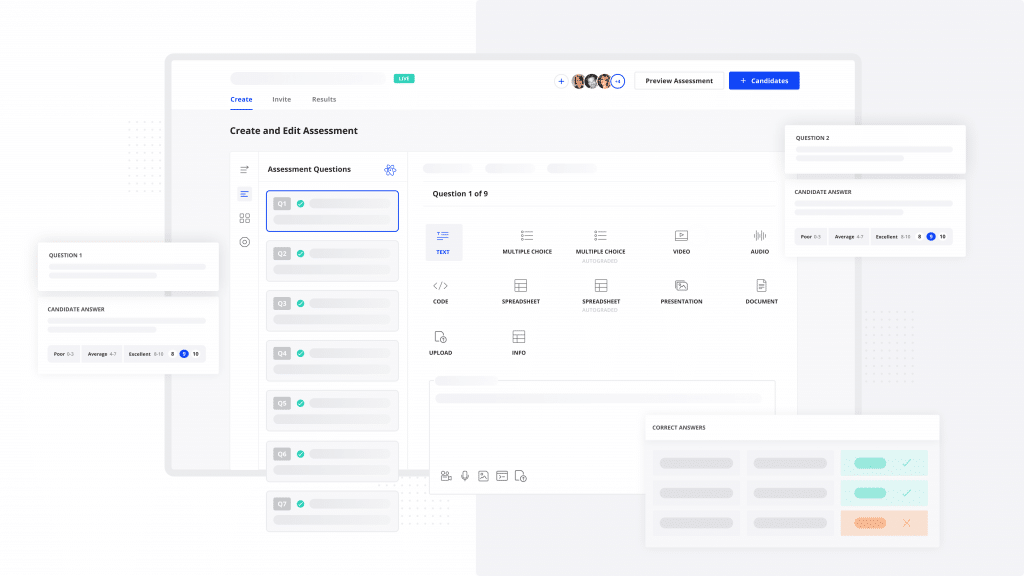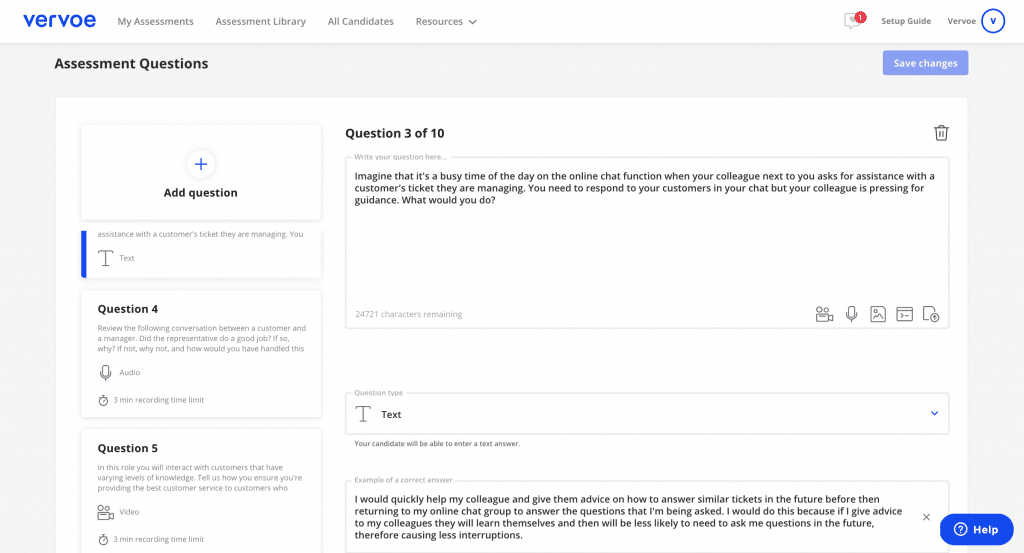Trying to create a skill assessment is like looking at a blank canvas sometimes. Where do you start? What questions should you ask? What order should they be in? How long should it be?
Based on best practices from 8,000+ organizations, here’s a foolproof guide for how to create a skill assessment personalized to your business.
1. Figure out what to test
Skill assessments should be about just that – skills. By that, we don’t mean only technical skills or only interpersonal skills. A custom skill test will let you assess what matters to you in your hiring.
To start, take a look back at your job description and speak to your team or the hiring manager. You’re looking to understand what a new hire might do on a day-to-day basis. Consider:
- The tools they are likely to use daily
- The tasks they will be responsible for
- Your business goals and how this person contributes to them
- How your team works together and the values you share
After this exercise, you’ll have a sense of the core hard and soft skills your new hire will need to have.
2. Create the right questions
Now that you know what you need to assess, you can think about questions that help paint a picture of what a candidate will contribute.
Creating a skill test can be simple if you’re familiar with the role, or extending a team you already have. If you’re hiring an email marketer, for example, the rest of your marketing team can help create specific questions or situations that the person might face on the day.
It might be harder to create a skill assessment for a role that you’re not familiar with. This is especially true if there are complex technical components of the role.
An easy place to start is to think about three tasks your candidate will have to do on the job. There will be many but choose just the three most important ones.
Write one question for each one. Ask candidates to do the task itself or something as close as possible. You’ll get more relevant insights if you let people demonstrate how they approach the job’s actual tasks, instead of hypothetical situations.
You can also use Vervoe’s assessment creator to prompt you with relevant questions. Based on the job description, you’ll get a list of the skills that people usually seek out in this role and a good starting point of questions that help you understand how well someone demonstrates those skills.

3. Use a variety of question formats
Ok, you have your questions for candidates. How do you make it less like a survey and create a skill assessment that’s engaging for candidates?
It’s essential to include a variety of questions in the assessment. This prevents candidate drop-off, and it also means you get a better insight into candidates.
For example, it would be nearly impossible to tell if a digital marketer could write content based on a multiple-choice question. And a short answer question won’t show you if a sales rep can deliver a presentation.
To show you how well they can do the job, applicants should be assessed in the way they would solve the problem in the course of the role. That means that if you want to see how well someone can write, you should ask them to give a sample of writing. If you want to see how they communicate verbally, you could use an audio recording. And if the role includes creating presentations, editing documents, or writing code – you should ask them to do that too!
There’s just a small word of caution. It can be easy to get carried away with video questions. We’re only human, so of course, we like to see our candidates’ faces. But do you want to watch tens or even hundreds of videos, each a few minutes long?
Remember, the purpose of video responses is to pick up on things more substantive than the answer: body language, communication style, and confidence. For some roles, this can be important, say in Sales roles. But for others, the proof will be in the pudding—their answers to real problems.
The magic number for video questions is two to three per assessment. And only if you really need it.
Here’s an example of the different formats available in a Vervoe assessment for a Customer Support Rep. For this role, it was important to write emails to customers and provide support over the phone. In one assessment, they were asked how they would respond to customers in both formats.

4. Create a good assessment flow
Now that you have your questions, you can put them together into one assessment. Based on our data from 8,000 companies, here’s what works to make sure candidates complete the assessment.
Ease into the assessment
You wouldn’t start a conversation with someone by grilling them with hard questions. An online assessment is the same. When you create a skill assessment, start with a multiple-choice question that eases them in.
Ask them to solve a problem
The meaty part of the assessment should be based on real-world scenarios. Get the candidates to dive into some of the challenges they’ll come across in the role. As a good indication, there should be three to five of these heavy-hitting questions.
Make it real. Allow applicants to think, draw on their experience, and apply what they’ve learned.
Wrap it up with culture
Toward the end of the assessment is the best place to include questions relating to your values and culture. How would they contribute to your organization? Do they share the ‘why’ of your business? This is an excellent place to wrap up with one to two questions.
Creating a skill assessment isn’t an exact science, but there is a natural flow, just like a conversation. Remember to focus on the skills they bring to the table and set your candidates up for success rather than tripping them up. You can then refine your list and raise the bar.
5. Make it the perfect length
What’s worse than death by PowerPoint in a presentation? Death by too many questions on an assessment.
The purpose of a skills assessment is to screen people in based on their skills, not screen them out of the process by making it impossible to complete.
Generally, about ten questions is a good aim, with a completion time of less than one hour. For entry-level jobs, you might like to consider an assessment that’s a bit shorter and hones in on the core skills your people need to demonstrate. For complex roles, you might need a more in-depth assessment.
Final tips for how to create a skill assessment
For any skill assessment, and for hiring in general, communication is critical. While candidates tell us they love showing what they can do, you must prepare them for the process.
Our recommended approach is to let candidates know upfront that a skills assessment is part of the process. It’s not something they need to be wary of; rather, it’s an opportunity for them to showcase their talents and put their best foot forward for the role.




















